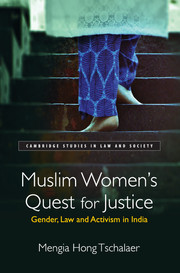Book contents
- Frontmatter
- Dedication
- Contents
- Preface
- Acknowledgements
- Abbreviations
- 1 From Legal Binaries to Configurations: Muslim Women's Rights Activism in South Asia
- 2 A Multidimensional Approach to Muslim Women's Activism: Mapping the Legal Landscape in the City of Lucknow
- 3 Destabilising Gendered Proprieties: Muslim Women's Visibility within the Public Space
- 4 Vying for a Gender Just Islamic Marriage Contract: Women's Legal Spaces
- 5 Legal Realities: Doing Gender Justice from Below
- 6 Muslim Women's Quest for Justice: Theoretical Implications and Policy Suggestions
- 7 Appendices: Model-Nikahnamas
- 8 Glossary
- 9 Bibliography
- 10 Index
1 - From Legal Binaries to Configurations: Muslim Women's Rights Activism in South Asia
Published online by Cambridge University Press: 08 February 2018
- Frontmatter
- Dedication
- Contents
- Preface
- Acknowledgements
- Abbreviations
- 1 From Legal Binaries to Configurations: Muslim Women's Rights Activism in South Asia
- 2 A Multidimensional Approach to Muslim Women's Activism: Mapping the Legal Landscape in the City of Lucknow
- 3 Destabilising Gendered Proprieties: Muslim Women's Visibility within the Public Space
- 4 Vying for a Gender Just Islamic Marriage Contract: Women's Legal Spaces
- 5 Legal Realities: Doing Gender Justice from Below
- 6 Muslim Women's Quest for Justice: Theoretical Implications and Policy Suggestions
- 7 Appendices: Model-Nikahnamas
- 8 Glossary
- 9 Bibliography
- 10 Index
Summary
There are many misunderstandings about the Quran in regard to women's rights. Islam is not an obstacle toward the realisation of women's rights. The conservative clergy is!
– Shaista Amber, AIMWPLBThe postcolonial state needs to codify the Quran from a secular point of view so as to undermine misogynist interpretations of Muslim Family Law in the courts.
– Naish Hasan, BMMAOnce women understand their Islamic rights, they will also understand their rights as citizens.
– Shehnaz Sidrat, Bazme KhawateenThese voices belong to three prominent Muslim women activists based in the city of Lucknow. Lucknow is the capital of the north Indian state Uttar Pradesh, not far from the Nepal border, and home to a sizeable Muslim minority. Within the last decade, the city has – like no other Indian city – witnessed a proliferation of Muslim women's rights activists and accompanying womenled networks. These diverse groups are demanding gender justice from various religious perspectives within the framework of Islam. In their endeavour for justice, they reference both the Indian Constitution and the authority of the Quran in order to claim their rights as Muslim women and as citizens of India – home to the world's second-largest Muslim population. Their bold readings of the sacred texts challenge the dominant monolithic orthodox interpretations of women's rights concerning property, inheritance, education, divorce, and bodily integrity. According to these activists, the orthodox interpretations that were traditionally endorsed by Muslim India's powerful religious authorities, especially those affiliated with the all-national All India Muslim Personal Law Board, are directly linked to much of the dire economic, political, legal, and social realities faced by Muslim women in South Asia. Employing women-friendly interpretations of Muslim doctrine and tradition – derived from both secular and non-secular sources – these women are proactively stretching the boundaries of gender-appropriate activities within the public space. These innovative activists are leading rallies in major cities, drafting their own Muslim marriage contracts (nikahnama), solemnising weddings, dissolving marriages, engaging in dispute settlements, and participating in political debates.
- Type
- Chapter
- Information
- Muslim Women's Quest for JusticeGender, Law and Activism in India, pp. 1 - 39Publisher: Cambridge University PressPrint publication year: 2017



